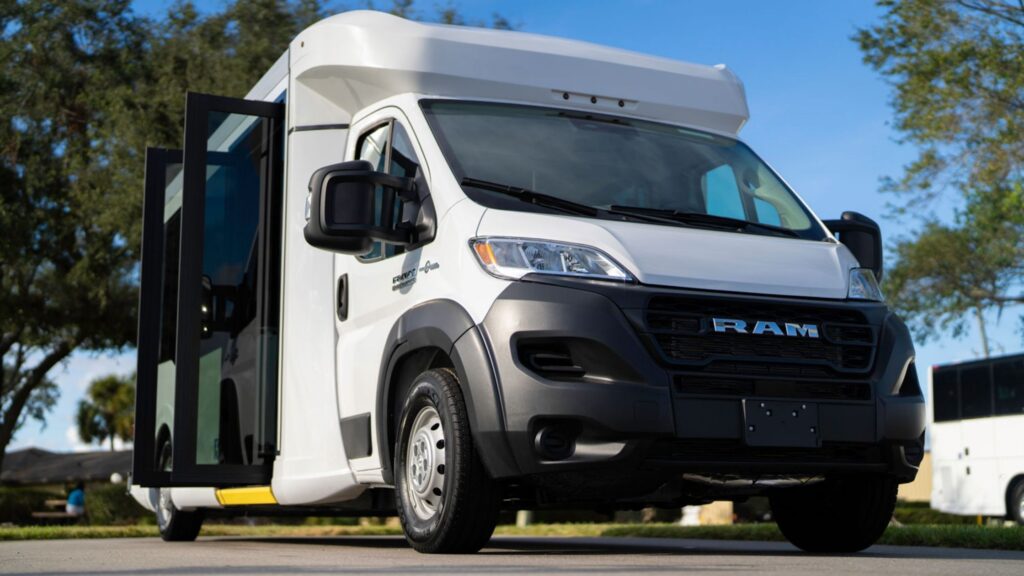- November 14, 2025
- Blog
- Posted by Kiran Kaur
- Comments Off on ADA Compliant Vehicles and Low-Floor Transit: What Fleet Operators Need to Know

Accessibility is shaping the future of fleet planning. According to the U.S. Census Bureau, about 18 percent of Americans are age 65 or older, representing more than 61 million people. Projections show that by 2030, more than 20 percent of the U.S. population will be 65 or older. This demographic shift means mobility needs will continue to grow.
The National Council on Disability’s 2025 report found that more than 35 million adults live with mobility disabilities, making it the second most common disability in the United States. The report also noted that riders using power wheelchairs or scooters are “largely locked out” of many existing transportation services because ADA compliant vehicles are not available in sufficient numbers.
At the same time, ridership is recovering. The American Public Transportation Association reported that [...]
- November 7, 2025
- Blog
- Posted by Isaac Cornell
- Comments Off on From Busworld to the Factory Floor: Why It Matters for Operators

I traveled to Brussels recently to represent ABC Companies at Busworld 2025, one of the largest global events for the bus and coach industry. I also visited VDL Groep headquarters and our manufacturing partner, VDL Van Hool, in North Macedonia.
The goal was simple: to observe, listen, and learn what is next for our industry, and to bring back insights that can help operators prepare for what is ahead. The trip reminded me that innovation is not just about new technology. It is about small improvements in process, design, and craftsmanship that make vehicles easier to run, service, and depend on.
What Stood Out at Busworld 2025Walking through the halls at Busworld offered a front-row view of how manufacturers are thinking about the next generation of vehicles. I focused on [...]
- October 16, 2025
- Blog
- Posted by Kiran Kaur
- Comments Off on Still Time to Save: How to Finalize Your Fleet Purchase Before Year-End
 Why You Should Finalize Your Fleet Vehicle Purchase Before the 2025 Tax Deadline
Why You Should Finalize Your Fleet Vehicle Purchase Before the 2025 Tax Deadline As 2025 winds down, many fleet operators are asking a critical question: “Can I still take advantage of bonus depreciation?”
The answer is yes; but only if you act quickly and meet the IRS requirement that eligible vehicles must be placed in service by December 31, 2025.
Under the One Big Beautiful Bill Act, operators can deduct 100% of the cost of qualifying new or used vehicles placed in service after January 19, 2025. That includes everything from motorcoaches and transit buses to shuttles and vans.
For many, that could mean up to $130,000 in tax savings per vehicle: funds that can be redirected into hiring, route expansion, or other operational improvements.
What “Placed in Service” Means for [...]- September 9, 2025
- Blog
- Posted by Kiran Kaur
- Comments Off on 3 Signs It’s Time for Preventative Maintenance on Your Bus or Shuttle

Preventive maintenance is more than best practice. For many fleets, it’s the foundation for long-term performance and cost control. As vehicle systems become more advanced, the need for structured maintenance has only grown to ensure safety, compliance, and operational reliability.
Studies show that fleets that invest in routine service experience up to 30 percent fewer breakdowns and 20 percent lower maintenance costs. These benefits are even more essential as aging fleets meet new performance and inspection standards.
So how do you know it’s time to shift toward preventive care? Here are three clear signs your fleet may be overdue.
Sign 1: Vehicle Efficiency and Responsiveness Are Declining
Are your vehicles using more fuel or taking longer to accelerate? These signs may suggest that engine systems, emissions components, or drivetrain elements are [...]
- August 5, 2025
- Blog
- Posted by Kiran Kaur
- Comments Off on How to Choose the Right Fleet Maintenance Partner in Colorado

Fleet maintenance has evolved from basic upkeep into a critical part of daily operations. Today’s vehicles are more advanced, with digital systems, alternative fuel technologies, and stricter compliance requirements. At the same time, fleet operators are managing aging equipment, technician shortages, and higher service expectations, all while trying to keep vehicles moving and costs under control.
The U.S. Department of Energy reports that more than 20 percent of new bus purchases in 2023 involved alternative-fuel systems or electric. As this trend continues, fleet service providers must be equipped to maintain both legacy diesel systems and next-generation platforms like CNG and EVs.
Three Key Traits of a Strong Fleet Maintenance PartnerChoosing the right partner means looking beyond price or proximity. Here are the three traits that matter most for Colorado-based operators:
- Broad Technical [...]
- August 5, 2025
- Blog
- Posted by Kiran Kaur
- Comments Off on 5 Essential Skills Every Fleet Technician Needs Today
 What’s Driving the Shift in Fleet Technician Skillsets
What’s Driving the Shift in Fleet Technician Skillsets Fleet operations are facing a turning point. Vehicles are becoming more complex, data-driven, and environmentally advanced. Yet as fleets race ahead, technician skillsets and capabilities are struggling to keep pace.
Operators report that 77% of rising costs are their top concern, with driver shortages, increased regulation, and maintenance complexity ranking high among persistent challenges. Meanwhile, experienced technicians are retiring faster than replacements can be trained. A recent report estimates a shortage of nearly 613,000 technicians by 2024, with updated projections now reaching nearly 971,000 between 2024 and 2028.
At the same time, fleets using telematics and data tools are seeing measurable benefits. According to a recent industry trends report, GPS fleet tracking delivers an average of 16% savings on fuel, maintenance, and labor costs.
As [...]
- August 4, 2025
- Blog
- Posted by Kiran Kaur
- Comments Off on What is Programmed Fleet Maintenance?

Fleet operators today are navigating tighter budgets, technician shortages, and rising expectations around safety, compliance, and uptime. The traditional “fix it when it breaks” model no longer supports the scale or reliability that today’s transportation landscape demands.
Programmed fleet maintenance offers a structured, proactive alternative. It replaces guesswork with visibility, urgency with planning, and uncertainty with predictability. It is quickly becoming a central strategy for operators who want to run smarter, safer, and more sustainable fleets.
That’s why programmed fleet maintenance is gaining momentum. It gives operators structure where there was once chaos, helping them shift from firefighting to forward planning.
This article explains what programmed fleet maintenance is, why it matters, and how it supports long-term performance, safety, and profitability.
The Real Cost of Unplanned Fleet Maintenance DowntimeUnplanned downtime affects [...]
- August 1, 2025
- Blog
- Posted by Kiran Kaur
- Comments Off on How Bonus Depreciation Helps Operators Invest in Fleet Growth
 Why Timing Your Fleet Purchase Could Mean Big Tax Savings
Why Timing Your Fleet Purchase Could Mean Big Tax Savings In today’s transportation industry, timing matters especially when it comes to capital investments. That’s why fleet operators across the country are taking a closer look at a recent tax update that could significantly reduce their year-end expenses.
The “One Big Beautiful Bill Act” (OBBBA) restores 100% bonus depreciation on qualifying equipment, including new and used motorcoaches placed in service after January 19, 2025. For operators, this means greater financial flexibility, smarter tax planning, and an opportunity to reinvest in the future of their fleets.
Fleet Strategy Isn’t Just About Vehicles, It’s About Financial PlanningABC Companies supports fleet operators beyond the sale. As a long-time partner to private and public operators, we understand the challenges many are facing in today’s environment.
“For [...]
- July 16, 2025
- Blog
- Posted by Roman Cornell
- Comments Off on The Cornell Legacy: 50 Years of Transportation Leadership

When my grandfather, Clancy Cornell, founded ABC Companies in 1972, he wasn’t thinking about legacy. He was thinking about people. He was thinking about showing up early, finding the root of a problem, and fixing it right the first time. He was focused on earning trust through consistency, not convenience. Those early days were marked by adopting a hands-on approach, answering calls at all hours, personally delivering parts to a stranded fleet, and building our reputation for reliability and respect.
That mindset became the foundation of our family’s leadership style. My father, Ron, and my uncle, Dane, inherited those values and embraced growth with integrity. They built our business from a handful of service bays to a multi-state operation, guided by valuing relationships and earning trust. They expanded service centers, staffed technicians, and [...]
- July 10, 2025
- Blog
- Posted by Kiran Kaur
- Comments Off on Why Denver? A Closer Look at ABC’s Newest Market

Fleet operations are evolving. Across North America, operators are managing increasingly diverse fleets, responding to new regulations, and shifting toward zero-emission vehicles. This evolution is especially pronounced in Denver, one of the fastest-growing metro areas in the country, where both public and private operators are scaling up to meet rising demand.
According to the Colorado Department of Transportation, vehicles miles traveled in the Denver metro area increased by nearly 12 percent between 2014 and 2023. This growth places new demands on fleet infrastructure and maintenance capabilities. As the need for reliable fleet services in Denver continues to rise, many regional operators still lack access to full-service maintenance partners with the technical range to support traditional and emerging propulsion systems.
Transportation Trends Are Driving Demand for Fleet Services in DenverDenver [...]

